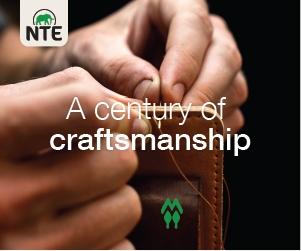Whisky helps keep craft skills strong

An initiative from malt whisky company The Macallan is supporting the preservation of artisan leathercraft skills at the UK’s oldest bookbinder.
A fund that aims to help save artisan craftsmanship will enable a bookbinder in the UK to pass on traditional skills in working with leather to a new generation. Special whisky from Speyside in Scotland has played a crucial role in the project.
Malt whisky brand The Macallan has launched a programme to help preserve craftsmanship in a wide range of sectors. It has called the programme, which has started off with total funding of £260,000, the Artisan Apprenticeship Fund. In early February, it named four companies as initial beneficiaries of the fund, including Shepherds Bookbinders. The other three are luxury garment maker Alexander Manufacturing, contemporary glass studio Glasstorm, and fine-art foundry Powderhall Bronze.
The London-based hand bookbinding business will receive a £60,000 share of the Artisan Apprenticeship Fund and will use the money to help it train an existing member of staff to become a skilled bookbinder. Under the guidance of expert bookbinder Jonathan Powell, the apprentice will learn all the key skills involved in binding books in leather, including gold-leaf finishing.
Shepherds has told World Leather that it works only with vegetable-tanned leathers, chiefly goatskin and calfskin. “The leather has to be naturally tanned,” the company explains, “so that it is supple and has a soft surface suitable for tooling in gold leaf in the traditional way.” Suppleness and a flat grain are qualities that bookbinders have always looked for in leather because of the importance of making sure the cover takes and retains the shape of the book. At Shepherds, craftspeople still pare the leather edges by hand, using a spokeshave and an edge-paring knife to ensure the corners and turn-ins of book covers are neat and smooth. These must be bump-free to make the decorative tooling on the corners fully effective.
All aspects
All of these traditional skills will now be passed on to the new apprentice with funding from The Macallan. The three-year apprenticeship will involve dedicated training days at the bench at the Shepherds workshop in Wiltshire, as well as undertaking formal courses in bookbinding. The new apprentice will also have weekly work experience days in the company’s bindery in London, plus three external visits to relevant institutions and binderies each year.
Shepherds Bookbinders managing director, Alison Strachan, comments: “The traditional skills we require of our bookbinders are wide-ranging and complex, and this funding will allow us to fully train a young person in all aspects of the craft. The Artisan Apprenticeship Fund is a fantastic initiative, and we are so grateful to The Macallan for helping us to ensure these skills will continue to thrive.”
A short distance from the bindery in London, Shepherds runs a shop that stocks materials for bookbinding projects and a vast range of paper for fine arts, crafts, design and printing. The company runs courses here, and at its workshop in Wiltshire, which is located in a thatched barn. In 1998, Shepherds took over the trading names of two of the most influential bookbinding companies in the UK, Sangorski & Sutcliffe, and Zaehnsdorf. By the time of the acquisition, these two famous firms had a combined history of 250 years and had contributed substantially to research into leather preservation techniques.
By this time, though, they had themselves merged to form one business, known as SSZ, which luxury leathergoods brand Asprey had formed in the 1980s and run for about ten years before selling to Shepherds.
Collective effort
At the core of this drive to preserve bookbinding, leathercraft and other skills is The Macallan Artisan Collective, a creative forum for craftspeople to network, exchange ideas, innovate and collaborate via live gatherings and digital events. Established in 2021, it champions and celebrates artisans, their philosophies, knowledge and skills, as well as the critical role they play in local and global economies. It is through this collective that The Macallan is delivering the Artisan Apprenticeship Fund, which is part of its commitment to preserving and safeguarding legacy crafts, trades, skills and values that will support employment for generations to come.
Its own legacy and traditions allowed it to raise the £240,000 to start the fund off. In 2021, The Macallan decided to release 288 bottles of a special whisky it called The Reach. This whisky was distilled in 1940 and had lain in a single sherry-seasoned oak cask for 81 years. It is the oldest whisky the company has ever released. Bottle number three went into a special display and went for auction at Sotheby’s in London. The display featured a presentation cabinet made from elm, with the wood coming from a tree that had grown on The Macallan estate before falling in 1940, the year the whisky was born. The cabinet was lined with glossy red leather.
The whisky itself was presented in a decanter made from mouth-blown glass by Artisan Apprenticeship Fund winner Glasstorm. For the Sotheby’s sale, the decanter was cradled in a specially commissioned sculpture of three hands, crafted by Renfrewshire-based artist Saskia Robinson using bronze from another of the Artisan Apprenticeship Fund winners, Powderhall Bronze. One hand symbolises the distillery workers who made the whisky. Another is modelled on the hand of Allan Shiach, a celebrated writer and screenwriter who was also chief executive of The Macallan until 1997. Mr Shiach’s grandfather was head of the company when The Reach went into its cask. The third hand is modelled on that of the brand’s current master whisky maker, Kirsteen Campbell.
Stuck for words
When The Reach emerged, Ms Campbell said working on it had been one of the highlights of her career. “It’s hard to put into words how truly special this whisky is,” she commented. Nevertheless, she went on to describe the spirit as having a deep auburn colour, with notes of dark chocolate, cinnamon, peat, plums and leather on the nose, and of treacle toffee, bramble jam, liquorice, ginger, nutmeg, charred pineapple, pecans and woodsmoke on the palate.
Sotheby’s said this was the oldest whisky ever to come to auction and it sold bottle number three in October 2022 for almost three times the estimate to a private collector in the UK; this sale provided the money for the Artisan Apprenticeship Fund.
For generations to come
Head of insight and sustainability at the 199-year-old whisky brand, Elizabeth McMillan, says The Macallan thrives as a local brand because of its relationships with communities and networks of craftspeople with whom it builds “shared value creation”. She says Shepherds Bookbinders fits into this because of its dedication to craftsmanship and quality and that the whisky company is proud to play a part in helping it to train and guide its next generation of artisans.
“The Macallan holds a deep affinity with all luxury artisans and master makers,” Ms McMillan continues. “Dedication to creativity, craftsmanship, innovation and collaboration are a key part of our brand DNA, and through The Macallan Artisan Collective and Artisan Apprenticeship Fund, we aim to establish a legacy of positive action by fostering meaningful progress for our key communities through partnerships, collaborations, and fundraising. Preserving and safeguarding legacy crafts, trades, skills, and values is an essential part of this, to help support employment for generations to come.”
Handcrafted luxury
Glasstorm co-founder Brodie Nairn says he has found the experience of taking part in the Artisan Collective interesting. One or two large companies are part of it, he explains, while many of the participants are small and some are tiny, with perhaps only one or two people involved. “What we all have in common is handcrafted luxury,” he says. “The Macallan runs so many initiatives and special projects and it realised it was working with 30 or 40 different artisan manufacturers and all of these companies have this link to handcrafted luxury.”
However, Mr Nairn warns that the skills a person has to have to be able to make things in this way cannot be learned from a computer screen or a software programme; nor can these activities be carried out by a robot. “They are skills that are handed down, handed over by the master to the apprentice,” he explains. “It is difficult to train someone in these crafts and it can take years before the new person is any good.”
On the subject of the Artisan Apprenticeship Fund, he says Glasstorm is “absolutely thrilled” to be part of it and that for The Macallan to have set it up “shows the true spirit” of the whisky brand. “For The Macallan to put this money into our companies is a significant contribution towards preserving these craft skills,” he says. “It’s very important.”
Sale at auction of a special bottle of whisky has provided the funding for The Macallan Artisan Apprenticeship Fund.
Credit: The Macallan































